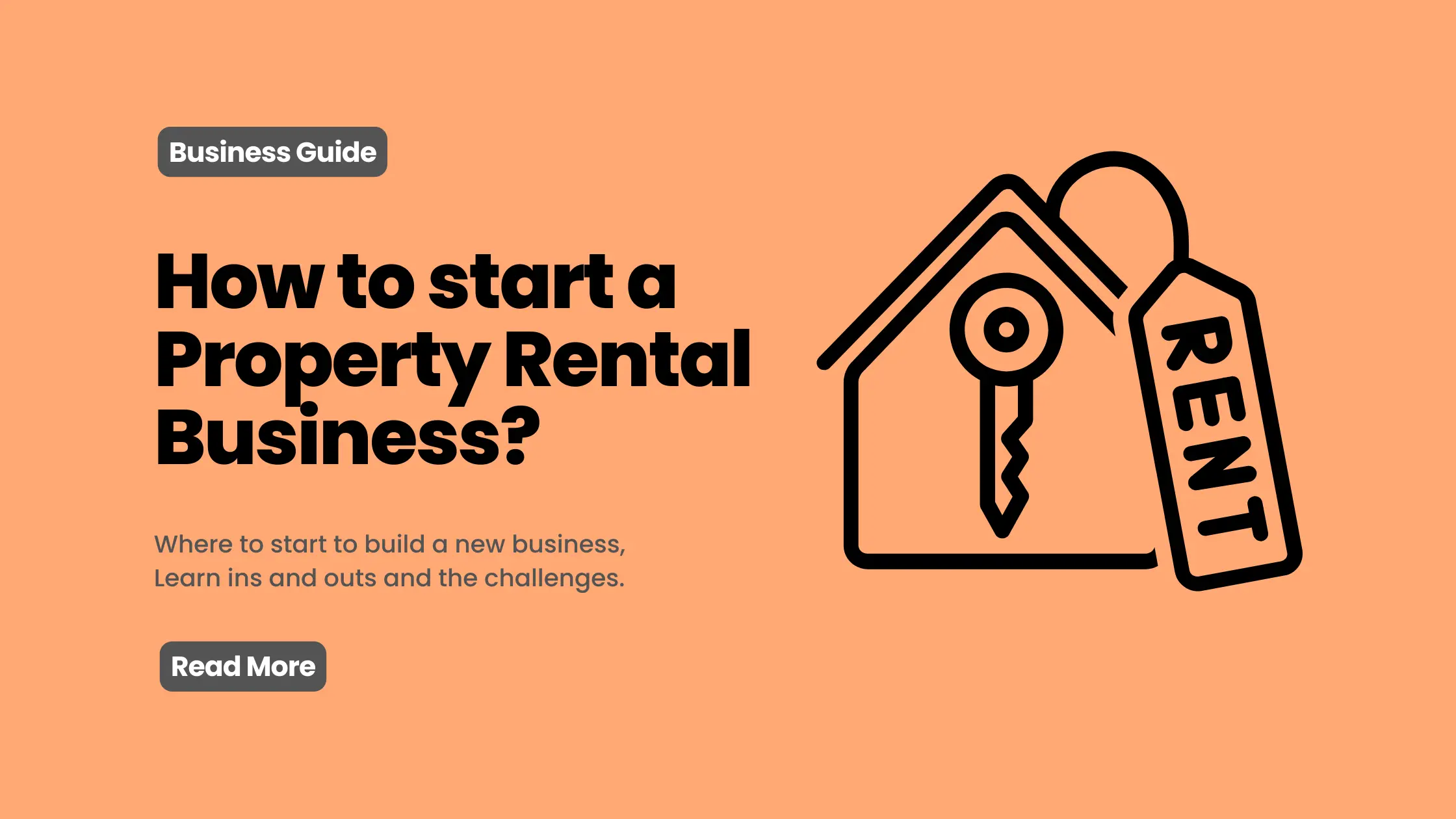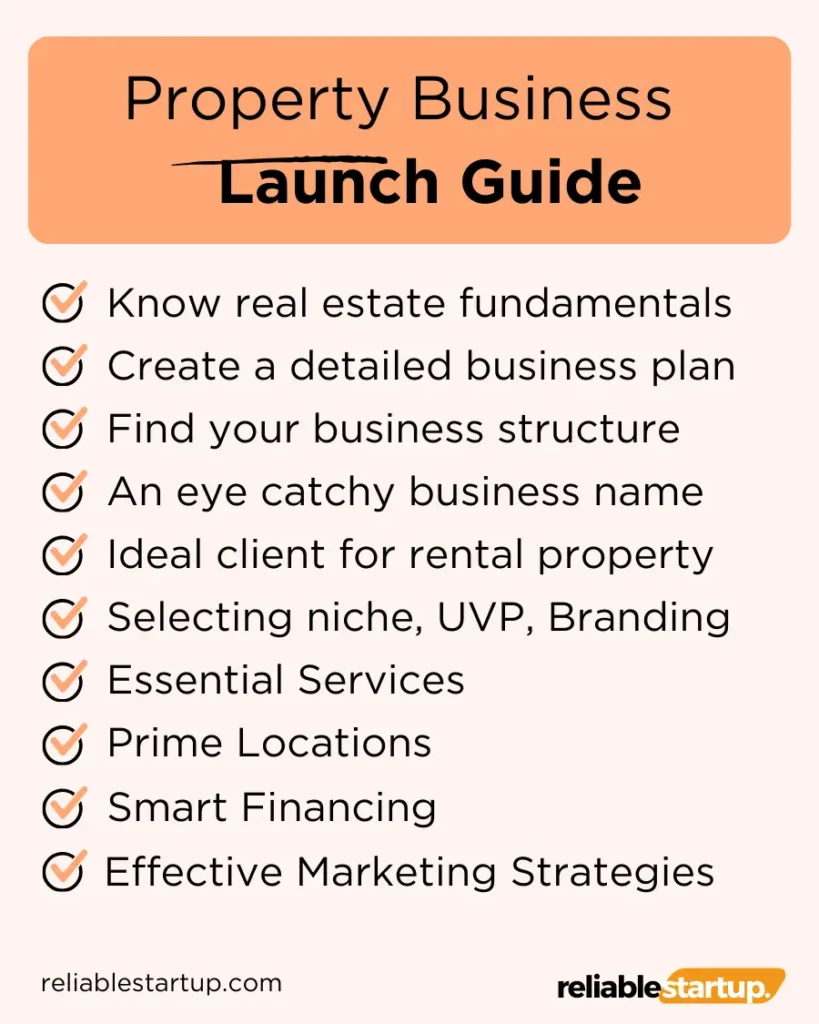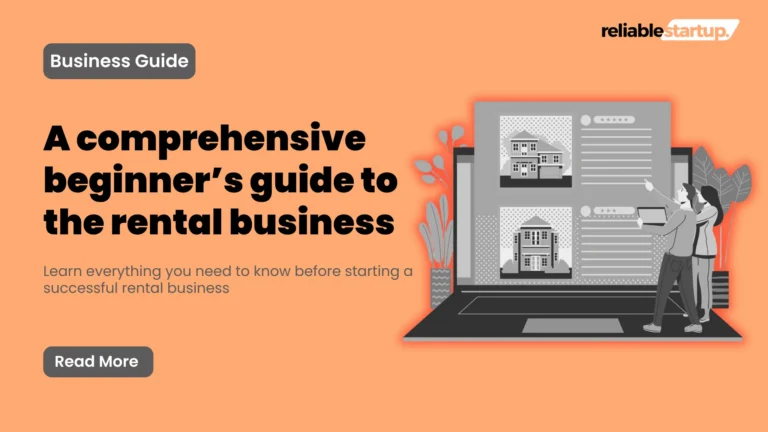How To Start A Property Rental Business? 10-Steps Guide

Investing in rental properties provides entrepreneurs with a reliable avenue to secure passive income and foster lasting financial stability. To start your property rental business, you need a proper plan, as Antoine de Saint-Exupery said, “A goal without a plan is just a wish.”
A solid property business plan shows you the steps and goals needed for success. Using a buy-and-hold strategy can help you achieve your long-term goals and make your investments more successful. This strategy involves buying properties and holding onto them for an extended period to benefit from rental income and property appreciation.
The rental property market is growing because more people are moving to cities (Urban Areas) and preferring to rent homes. This guide makes it easy by breaking down the process into simple steps, helping you understand where to invest and how to make money from your investments. Following these steps can help you navigate the real estate market and build a profitable property rental business.
Can I start a Property Rental Business with zero experience
Starting a rental property business without prior experience is achievable with thorough preparation. Begin by educating yourself on real estate basics, market trends, and investment strategies. Choose an appropriate business structure, secure financing through savings, loans, or partnerships, and comply with legal requirements such as licenses and insurance. Focus on finding suitable properties, implementing effective property management practices, and marketing to attract tenants.
Continuous learning and adaptation to market dynamics are crucial for sustained success in building and managing a profitable rental property portfolio.
Take these 10-steps before starting a Rental Property business
Before starting a rental property business, take these 10 essential steps to ensure thorough preparation and success, Here’s a step-by-step list to follow before starting a rental property business:

- Understand real estate fundamentals.
- Create a detailed business plan.
- Find your business structure.
- An eye catchy business name.
- Ideal client for rental property.
- Selecting niche, unique value proposition, and branding.
- Essential Services for a Successful Rental Property Business.
- Prime Locations: The Key to Successful Rental Properties.
- Smart Financing: The Backbone of a Profitable Rental Property Business.
- Effective Marketing Strategies for Rental Properties.
Following these steps will help you to lay a solid foundation and increase your chances of success in the rental property market.
1. Understand real estate fundamentals
Before diving into the rental property business, it’s essential to grasp the basics of real estate. This includes understanding property valuation, market trends, financing options, and legal aspects such as tenant laws and property rights. Gaining this foundational knowledge will help you make informed decisions and avoid common pitfalls.
2. Create a detailed business plan
A well-crafted business plan serves as a roadmap for your rental property venture. It should outline your goals, target market, financial projections, operational strategies, and marketing plan. This document not only guides your business decisions but also demonstrates your preparedness to potential investors and lenders.
A solid business plan should include the following key components:
Executive Summary: This is a concise overview of your entire plan, like a captivating elevator pitch. It hooks the reader and highlights your rental property business purpose, target market, competitive edge, and financial goals.
Company Description: Here, you delve deeper into your business itself. Explain what you offer (Property or Apartment), your mission and vision, and your legal structure.
Market Analysis: Insights into the current state of the housing market and investment opportunities based on local real estate research.
Competitive Analysis: Identify your competitors, their strengths and weaknesses, and how your business will stand out.
Management and Personnel: Showcase the team’s experience and qualifications. Explain how your team’s skills will drive the property rental plan forward.
Marketing Plan: Detail your strategy for reaching your target market. This includes your pricing strategy, advertising channels, sales approach and quality tenants for your properties.
Financial Plan: This section lays out your financial roadmap towards property business. Include forecasts for revenue, expenses, and profitability. You might also include funding requests if seeking investment.
3. Find your business structure
When starting a rental property business, you can choose from several business structures, each with its advantages and disadvantages. The main business structures include:
- Partnership
- Sole Proprietorship
- Limited Liability Company (LLC)
- Corporation
- C Corporation (C Corp)
- S Corporation (S Corp):
- Real Estate Investment Trust (REIT)
Choosing the right structure depends on your business goals, the level of liability protection you need, tax considerations, and the complexity you’re willing to manage. Consulting with a legal or financial advisor can help determine the best structure for your property business.
4. An eye catchy business name
An eye-catching business name is crucial for making a strong first impression and attracting potential customers (Tenants). Here’s what makes a business name stand out:
- Memorable Name
- Relevant to business
- Unique from others
- Easy to Spell and Pronounce
- Positive Connotation
- Scalable in market
- Available Domain and Social Media Handles
For example, a rental property business could use names like “Prime Rentals,” “Urban Haven Properties,” or “EasyLiving Homes.” These names are simple, relevant, and suggest a positive, comfortable experience for potential tenants.
5. Ideal clients for rental property
When defining your ideal clients for a rental property business, consider the following factors:
- Are they commercial or Residential clients?
- What is their annual or monthly income?
- What is the Lifestyle and demographics of the client?
- Are they married or single?
- How many children they have?
- What social media accounts they run?
- Do they like to use our rental home, apartment for parties and social events?
By understanding and defining these aspects of your ideal clients, you can better target your marketing efforts, choose the right properties to invest in, and offer services that attract and retain the right tenants for your rental property business.
6. Selecting niche, unique value proposition, and branding
a) Selecting niche
Your niche is the specific segment of the rental market that you want to target. Choosing a niche can help you stand out in a crowded market and attract tenants looking for specific types of properties. Here are a few examples of niches in the rental property market.
Vacation Rentals: Properties rented out for short-term stays, often in tourist areas.
Luxury Rentals: High-end properties with premium amenities targeting affluent clients.
Student Housing: Affordable and conveniently located properties near universities and colleges.
Family Homes: Larger properties with family-friendly features like multiple bedrooms, safe neighborhoods, and nearby schools.
Pet-Friendly Rentals: Properties that welcome pets and offer amenities like fenced yards or nearby parks.
Senior Living: Properties designed to cater to the needs of elderly tenants, such as single-story homes or buildings with elevators and accessibility features.
You don’t need to have a niche, but it can be helpful if you spot a market gap or have in-depth knowledge of a particular type of property.
b) Unique value proposition (UVP)
Your UVP is what sets your rental property business apart from the competition. It’s the unique benefits and value that you offer to your tenants, making your properties more attractive. Here are some elements that could form your UVP:
- Exceptional Customer Service
- Modern Amenities
- Convenient Locations
- Flexible Lease Terms
- Maintenance and Upkeep
- Community Feature
c) Branding
Branding involves creating a distinct image and reputation for your rental property business that resonates with your target audience. It includes the visual identity, messaging, and overall experience you offer. Here’s how you can develop strong branding:
- Color Palette and Logo
- Consistent Messaging
- Values and Mission Statement
- Property Presentation
- Online Presence
- Tenant Experience
By clearly defining your niche, UVP, and branding, you can create a strong, distinct identity for your rental property business that attracts and retains the right tenants.
7. Essential services for a successful property rental business
Offering top-notch services is crucial for attracting and retaining tenants in your rental property business. Here’s a breakdown of the key services that can set your properties apart and ensure tenant satisfaction:
- Responsive Property Management
- Regular Maintenance and Upkeep
- Clear Communication
- Convenient Payment Options
- Security Measures
- Amenities and Extras
- Tenant Screening
- Lease Flexibility
By focusing on these essential services, you can enhance the attractiveness and functionality of your rental properties, leading to higher tenant satisfaction and business success.
8. Prime Locations: The key to successful rental properties
The location of your rental properties is a critical factor in attracting and retaining tenants. Here’s why choosing the right location is so important and what you should consider:
- Accessibility
- Neighborhood Quality
- Proximity to Amenities
- Employment Opportunities
- Growth Potential
- Community Atmosphere
- Public Services
- Local Regulations
By prioritizing prime locations, you can enhance the attractiveness of your rental properties, command higher rental rates, and enjoy lower vacancy rates. The right location not only benefits your tenants but also contributes to the long-term success and profitability of your rental property business.
9. Smart Financing: The backbone of a profitable rental property business
Securing favorable mortgage terms and understanding loan options are crucial for your rental property business. A strong credit score, substantial down payment, and detailed business plan can help you secure funding.
Effective financial management ensures rental income covers mortgage payments, taxes, insurance, maintenance, and fees. Maintain precise financial records and reserve funds for unexpected expenses. This approach ensures the profitability and growth of your rental property business.
10. Effective marketing strategies for rental properties
Marketing your rental properties effectively is very crucial for attracting tenants and maximizing occupancy. Here are key strategies to consider:
Online Presence: Maintain a professional website with high-quality photos and detailed property descriptions. Utilize online listing platforms like Zillow, Trulia, and Craigslist to reach a broader audience.
Social Media Engagement: Leverage social media platforms such as Facebook, Instagram, and LinkedIn to showcase your properties. Engage with potential tenants through posts, stories, and targeted ads.
Email Marketing: Build an email list of potential tenants and send regular updates about available properties, special offers, and community events.
Local Networking: Establish relationships with local real estate agents, relocation services, and community organizations to increase referrals and visibility.
Tenant Referral Program: Incentivize current tenants to refer new tenants by offering discounts or rewards for successful referrals.
Virtual Tours: Offer virtual tours of your properties through videos or 3D walkthroughs to allow potential tenants to view properties remotely.
By implementing these strategies, you can effectively market your rental properties, attract quality tenants, and maintain high occupancy rates.
Final Verdict
In conclusion, implementing these strategies effectively, you can enhance the visibility of your property rental business, attract a steady stream of quality tenants, and maintain high occupancy rates. Consistent online presence, engaging social media efforts, and strategic networking will not only fill vacancies but also establish your rental business as a preferred choice in the market.
Good luck!






